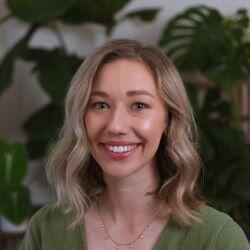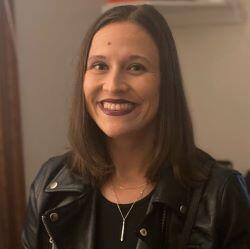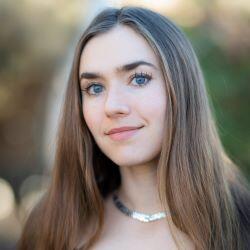
2022 commencement - Top: Holly Gildea, Krisha Aghi.
Middle: Emilio Emilio Soto Soto, professor Joni Wallis, professor Michael Silver, Kevin Yu.
Bottom: Jocelyn Breton, Zuzanna Balewski
Congratulations to our recent and upcoming Neuroscience PhD Program graduates: Zuzanna Balewski, Ellen Zippi, Holly Gildea, Sylvia Madhow, Krisha Aghi, Amanda Tose, Azure Grant, Jacob Miller, Maimon Rose, Emilio Soto Soto, and Kevin Yu!
Read our Q&A below with some of the graduates to learn about their most interesting discoveries, future plans, and words of advice.
Ellen Zippi, Carmena lab 
Thesis: Neuroprosthetic skill learning and stimulation-based neurmodulation
What is the most interesting thing you discovered in your research here?
My research used brain-machine interfaces to investigate neuroplasticity in skill learning and in new neurotherapies. An interesting discovery from my work is that the brain selectively modifies cortical population dynamics in groups of neurons whose activity is causally linked to behavior.
What are you doing next?
After graduating in August, I’ll begin working at Apple in Cupertino as a Machine Learning Researcher.
Do you have any advice for incoming or current students?
Try to learn as many new things as possible! Grad school is a great time to leave your comfort zone, explore new interests, and find out what really motivates you.
Holly Gildea, Dillin lab 
Thesis: C. elegans glial HSF-1 protects from stress and aging via a novel neural mechanism
What is the most interesting thing you discovered in your research here?
I found that glia are able to communicate to other cells about intracellular stress in an incredibly specific way, unique from the other systems we’ve studied. This coordination changes the whole animal’s physiology in a way that protects it from that particular kind of stress, expanding our understanding of sensory modalities to include intracellular states.
What are you doing next?
I am moving on to a postdoc at NYU Langone in Shane Liddelow’s lab to study how astrocytes contribute to aging in the brain! Team glia forever!
Do you have any advice for incoming or current students?
Enthusiasm for your work goes further than you think! On the days when it doesn’t, remember that you deserve to feel like you belong here, you deserve to be respected, and you deserve to be cared for and mentored.
Jacob Miller, D’Esposito lab
Thesis: The neural architecture of working memory: anatomical and functional studies of prefrontal cortext
What is the most interesting thing you discovered in your research here?
At Berkeley, I investigated how individual-level consideration of anatomical and functional properties of the prefrontal cortex can help us better understand its role for the remarkable flexibility of human behavior, especially in the context of working memory. Anatomically, careful identification of often overlooked individual-level morphological features (such as tertiary sulci) serve as a bridge between the microanatomical and functional properties of prefrontal cortex. Individual-level cognitive context also dramatically influences prefrontal cortex activity and selectivity patterns. Through a longitudinal neuroimaging study, we showed that long-term task training and learning within individuals can lead prefrontal cortex to develop selectivity for individual items in working memory. These results are akin to patterns of prefrontal cortex activity usually only detectable in electrophysiology studies and establish novel evidence for long-term memory influences on working memory maintenance.
What are you doing now?
I’ve started a postdoc fellowship at the Wu Tsai Institute at Yale, working with Profs. John Murray and Amy Arnsten to investigate how the prefrontal cortex supports working memory by linking across different studies, species, and scales of functioning.
Do you have any advice for incoming or current students?
Neuroscience is a collaborative endeavor from everyone in the field and adjacent lines of work. As much as anyone can, taking a step back from viewing science as competition between labs and instead as a shared process toward a common goal of understanding brain and behavior helped me feel much better about my work and place in grad school. No single study of animal neurophysiology or human neuroimaging can serve to explain the deepest questions of brain-behavior links, we can only try and unravel that mystery through a collaborative accumulation of knowledge.
Azure Dominique Grant, Kriegsfeld & Wilbrecht labs 
Thesis: Reproductive, Metabolic, and Automatic Networks Across the Female Lifespan
What is the most interesting thing you discovered in your research here?
The female reproductive and autonomic nervous systems appear so tightly related that easy-to-measure signals like heart rate variability and skin temperature can be used to monitor pubertal development, predict preovulatory LH surges, and track pregnancy and menopause. I think this is one of the most impactful things our wearables could do — but don’t (yet!).
What are you doing now?
I work as a researcher at Levels Health, studying the interactions between hormonal state and metabolic health. I also consult for Crescent Health, where I help make features & programs that keep track of people’s biological rhythms.
Do you have any advice for incoming or current students?
Find a question that you care about more than anyone else — and then do your best to learn more about that question than anyone else.
Krisha Aghi, Isacoff lab 
Thesis: Heterogeneous properties of synaptic transmission at Drosophila larval neuromuscular junction
What is the most interesting thing you discovered in your research here?
Synapses (fly neuromuscular junctions in particular) are incredibly hardy and have a multitude of ways to ensure stable neurotransmitter release. It’s remarkable how much you can perturb them and still get them to work.
What are you doing next?
I am in the process of applying for postdocs in neuroendocrinology, focusing specifically on how gonadal hormone states affect neural circuits and corresponding metabolic behaviors. I will still be keeping my options open as I decide what career move to pursue next!
Do you have any advice for incoming or current students?
Please please PLEASE make sure you build in relaxation time/time outside of doing research. You are a multifaceted individual and cultivating hobbies and interests outside of science will only be a boon to you as you progress in your PhD. This includes making friends and community outside of science!!!
Kevin Yu, Theunissen lab 
Thesis: An Auditory Memory System for Individual Vocal Recognition in the Zebra Finch
What is the most interesting thing you discovered in your research here?
Zebra finches are social songbirds that use several types of vocalizations to communicate with each other, including songs and calls. Each bird produces their own unique version of these vocalizations, so they can use them to signal their identity and recognize each other. While studying how they are able to do this, we tested their memory capacity to see how many different individuals they can recognize, and found that they can remember at least 50 other individuals from just hearing their songs or calls. That’s a lot of birds!
What are you doing now or next?
I will be staying in the Bay Area to do artificial intelligence research in industry.
Do you have any advice for incoming or current students?
Just try your best!
Zuzanna Balewski, Wallis lab 
Thesis: Prefrontal and subcortical dynamics of value-based decision making
What is the most interesting thing you discovered in your research here?
We make complex decisions using both fast judgements and slower, more deliberative reasoning, but if and how these systems interact is not well understood. We recorded from areas of the brain involved in these processes: the caudate nucleus, where we observed rapid signals that attract eye movements to valuable stimuli, and the orbitofrontal cortex, where we observed serial value representations of the available options. Signals from both regions biased subsequent choices but were independent from each other, suggesting these two valuation systems operate in parallel.
What are you doing next?
I’m applying for industry positions and planning a road trip to Alaska!
Do you have any advice for incoming or current students?
Make time to learn and do things not related to your research projects. You will be a better scientist and a happier person!

